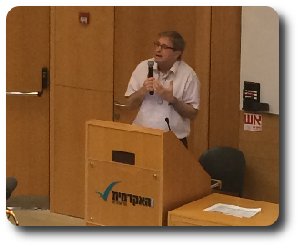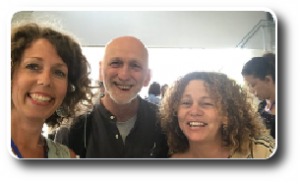 It was a privilege to attend this conference and to be a part of 3 amazing days listening to the most influential people in NVR. The conference was opened by Haim Omer, who also gave a keynote speech and workshops alongside Nahi Alon, another clinical psychologist.
It was a privilege to attend this conference and to be a part of 3 amazing days listening to the most influential people in NVR. The conference was opened by Haim Omer, who also gave a keynote speech and workshops alongside Nahi Alon, another clinical psychologist.
To sit alongside such a wealth of experts in this field, such skilled and reputable practitioners who have developed strands of the approach in their own way, Uri Weiblatt on Shame, Irit Schorr Sapir on ADHD, and Dan Dolberger on AED (Adult Entitled Dependency) to name but a few. The conference was attended by at least 350 practitioners from all over the world including Belgium, France, Germany, Austria, England and obviously Israel.
The conference was impeccably organised by Sharon Beiman and held at the college in Jaffa. Local students helped the three days run smoothly by supporting the delegates to attend the designated chosen workshops. We were made to feel so welcome and very well looked after. Lunch consisted of a host of amazing delights of sweet and savoury treats to dine on whilst lounging in the sunny communal areas during the break times; we were even offered a walking tour around old Jaffa Town during the first day, showing the local sights in the flea market district.
The workshops on days two and three were brilliant, and we agreed to each choose a different one and feed back to one another of the experience.
I chose:
• NVR at school | Cakebread, Callander, Okereke, Campforts, van Nus
• Hitting the wrong basket! when trauma-based NVR merges with neuro de escalation, yellow is the new red | Thelen, Göttl, Ofner
• Regulating intense shame of children, adolescents and their parents | Uri Weinblatt
Uri said: In recent years, the emotion of shame has drawn considerable research attention. Scholars have assigned shame an increasingly central role in various psychological conditions, ranging from social phobia and eating disorders to school refusal, PTSD and violence. In spite of these developments, a structured approach for shame regulation and management for children, adolescents and their parents has yet to be introduced – possibly, because the field of “shame therapy” is so new.
The importance of addressing shame rests on two basic assumptions.
1. The first is that, at the heart of many problems that bring a client to therapy in the first place – be it a child acting aggressively, communication problems between parents and teens, school problems and more – lies unregulated shame, which contributes to intense suffering, for both the child and his or her environment.
2. The second premise is that most of the disruptions in a therapeutic relationship are shame-related. In other words, relationships in a child’s life – both in and outside therapy – are, to a large extent, governed (and compromised) by shame.
As a result, without the continual regulation of shame in the therapeutic encounter, even the most sophisticated interventions offered to children and their families, and even if they are implemented with the highest degree of good will, at best have a minimal benefit, and at worst intensify shame. The latter outcome is bound to lead to the rejection of the intervention by the client, as well as to conflict and ‘resistance’ in the therapeutic relationship. The presentation addresses this issue by outlining a unified and clearly structured therapeutic approach which is based on NVR interventions and has been tailored to address the unique challenges of regulating shame. The term “regulation” is of special importance because, in therapy, clients often experience either too much or too little shame, conditions that are known as “shamefulness” and “shamelessness,” respectively. Dealing with these aspects is crucial for therapy’s success. The presentation relays how children, as well as their parents, can oscillate between shameful and shameless states – a transition that tends to lead to either aggressive or withdrawn behaviours – and introduces an innovative approach to managing and stabilising such conditions.
The whole three days was very enjoyable and the 6th International NVR Conference will be held in Austria in 2020.

Rachael Aylmer
Accredited NVR Practitioner
Associate Director
